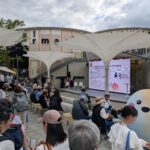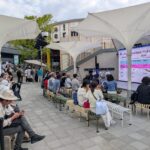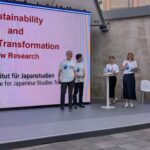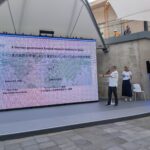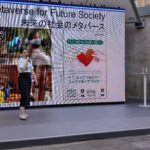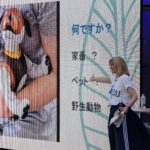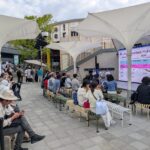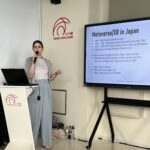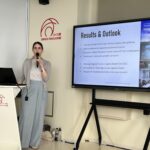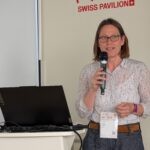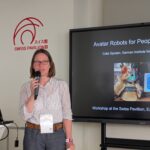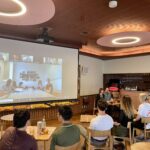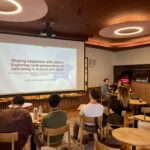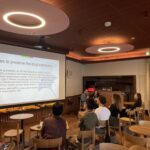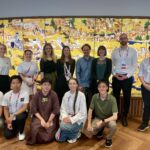DIJ Newsletter 80, Summer 2025

Articles
Bratwurst, Einstein, and Happiness: DIJ researchers at Osaka Kansai Expo
Approximately every five years, the world meets in one place to exhibit itself – at the World Expo. In 2025, the Expo takes place for the third time in Japan and for the second time since 1970 in Osaka. The initial skepticism and criticism that accompany every mega-event such as the Olympic Games or World Cups have now given way to great interest and even some enthusiasm. In the age of artificial intelligence, social media, and global networks, how can people be attracted to a fairground of nations? The organisers seem to have developed a successful concept under the motto ‘Designing Future Society for Our Lives’: At the end of June, the Expo 2025 Osaka Kansai set a new daily attendance record with 195,000 tickets and welcomed its ten millionth guest less than three months after opening: the Asano family from the city of Yamagata in northern Japan. The journey to Osaka was not quite as far for the three DIJ delegations from Tokyo, who visited the Expo in May and June to present the institute and its research at the German, Swiss, and Austrian pavilions.
To kick off the DIJ visits at Expo 2025, Franz Waldenberger, Barbara Holthus, Isaac Gagné, and Nicole Marion Mueller presented the DIJ and its two research clusters of Sustainability in Japan and Digital Transformation at the German Pavilion in Japanese and English. Director Franz Waldenberger introduced the DIJ as part of the international network of the Max Weber Foundation and outlined the challenges of the Green Transformation (GX), which affect Germany and Japan equally. Nicole Mueller explained the relevance of the Metaverse comparing Japan and Germany with a focus on the areas of infrastructure, technology and society, while Isaac Gagné provided insights into Expo history and presented the visitors with the tricky task of guessing the mascots of past Expos. Barbara Holthus presented her research on human-animal relationships and pets in Japan. The interactive presentations of the DIJ and its research met with great interest, partly because the stage was right next to a stand selling German beer and bratwurst, as Franz Waldenberger revealed with a wink.
Just a few days later, Nicole Mueller visited the Expo for the second time, this time with her colleague Celia Spoden. They had been invited by the Swiss Pavilion, where they presented their research on the metaverse and avatars under the thematic focus ‘Friendship with AI’. In her presentation ‘Avatar robots for people with disabilities’, Celia Spoden gave insights into her research project on cyber-physical spaces and avatar technologies as opportunities for an inclusive society. Nicole Mueller’s lecture ‘Japanese Metaverse Imaginaries’ presented her research on Japanese visions of the future of extended reality with a special focus on virtual assistants and pets in the metaverse. Among the guests were robotic companions of a special kind: the Lovots, equipped with emotional AI, vied for the audience’s attention with their round googly eyes during the breaks, but were sent to sleep in the charging stations during the presentations. Lovots are robots developed by the Japanese company Groove X and are designed to establish an emotional connection with their owners. They can help overcome loneliness and offer a feeling of warmth and companionship. Disguised as cute little figures but equipped with adaptive software and a camera, they can also collect data of their surroundings and create profiles of their interaction partners. After their presentations in the Swiss pavilion, Celia Spoden and Nicole Mueller had themselves visually transformed into Albert Einstein with the help of artificial intelligence. You can see the result in the photo gallery.
In June, Christina Polak-Rottmann and Sebastian Polak-Rottmann were the third and for the time being last DIJ delegation at the Expo. They presented their research projects on happiness at the Austrian Pavilion in line with the Expo’s ‘Health and Well-being’ theme week. Following insights into cooperation projects with the Department of Japanese Studies at the University of Vienna, Christina Polak-Rottmann moderated the event and the subsequent lecture ‘Sharing happiness with others: Exploring rural perspectives on well-being in Austria and Japan’ by Sebastian Polak-Rottmann. He presented the results of his research on rural well-being and political participation in Aso, in Kumamoto Prefecture, which can be read in German in volume 67 of the DIJ’s monograph series and in English in an article in Japan Forum. The lecture also reflected on the fact that, from an international comparative perspective, quantitative data on life satisfaction often presents different conclusions about individual well-being compared to the personal happiness reported in qualitative interviews. This is why we need to look at what makes people happy rather than measuring how happy they are, Sebastian Polak-Rottmann explains.
The fact that happiness is very important to people in Japan and around the world can also be seen in the motto of the next World Expo in Japan. From March to September 2027, the city of Yokohama is inviting visitors to the International Horticultural Expo 2027, promising nothing less than a “Scenery of the Future for Happiness”.
Expo 2025 Osaka Kansai closes its doors on October 13.

